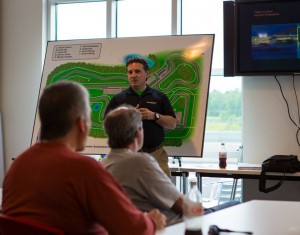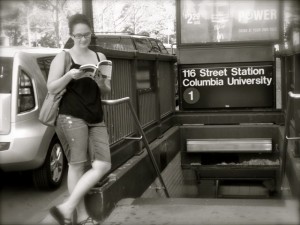Of the many lessons that my mother has definitely taught me, one that I often come back to is that you cannot let fear control your life. Usually this was under the guise of jumping rocks across a river, or peeing in the woods, or swimming far— out deep into the ocean. Perhaps she didn’t mean learning to drive a McLaren on the racetrack, but whatever the reason, I can hear her voice in my head whenever there is a cool opportunity and I am too scared to take the wheel.
As I sank low into the McLaren seat, I could almost feel the fear begin to grip me. I’ve played Forza before; my car never makes it around the first turn without a crash. Yet, I could see my Mom’s face, this was a once in a lifetime opportunity, this was not the time to be a sissy.
When you learn to drive a McLaren on a track, the first step is to sit in a classroom and learn about the power behind the car (for me this part was more like instilling the fear of death into me, maybe necessary for the men in the room?— total opposite affect on me). Then we got into cars with a professional driver, he drove and talked his way around the skill he was teaching (3 different guided groups launch/breaking, slalom, autocross, and a guided look at the inside of the car).
It didn’t matter what guided group I was in, I was nervous. I kept thinking ahead to how the driver would eventually be switching seats with me, putting me in the driver’s seat, and expecting me to pull off the very kind of driving that was making me want to pee my pants as a passenger.
In the end, I was too scared to do the launch, something about going 0-80-0 made me want to cry. I sat in the car while the driver did it, and for me, that felt like an accomplishment enough. I did take the wheel in the slalom course and the autocross. Both times the instructors told me to only go as fast as I felt comfortable, and in the beginning that was probably about 25mph; I was not sure any part of me would ever feel comfortable on a racetrack in a helmet. But both times, the instructor coached me, through every turn, every break, and every “I’m scared now” comment I decided to blurt out.
Truthfully, I’m not sure I broke 100mph on the track when I was driving. But believe me, I learned a ton and as far as overcoming fears goes, I attacked a minefield in my life that day. I loved driving the McLaren, and I wouldn’t trade the day at Monticello for the world.
But this is a teaching blog, and so I have some important things to point out.
- Track Driving was a completely new skill for me and may of the people participating in this day. Notice the approach— whole class mini lesson— teacher led guided session— student led guided session — (the next step would have been independent practice, which I would have jumped all over, if I had any energy left). Kudos to McLaren for using educationally sound best teaching practice. The teachers were totally engaged the whole time, their methodology in teaching sound, as well as their enthusiasm/knowledge within their subject matter. I couldn’t have been more impressed.
- I was too scared to do the launch. The ride with the driver was accomplishment enough. Sometimes are students are not ready for a new skill, but there is nothing wrong with exposing them, and providing them with the experience as a stepping stone for the day they are ready.
- I had a hard time listening to the instructors because I was nervous and felt out of my element in a helmet and a Supercar. How often does this happen to my students? Are they missing what I’m saying because they’re sitting in a desk with a pencil, instead of on a couch with a computer?
- My instructor happily repeated the same instructions he had told me on lap one, on lap twelve— and I desperately
appreciatedneeded the confirmation. At that point I was whispering in my head, “break at the second cone, come off slow, turn, accelerate” but knowing that he was saying the same thing aloud gave me the courage to step on the gas . . . even if it was just a little. Do I have the patience to happily repeat instructions to my students twelve times? How can I get them to tell me what they are thinking in their head? Am I acknowledging my students when they step on the gas a little? Am I continuing to press them to go for another lap? - I was exhausted. From driving. By the end of the day, I was seriously wiped. Poor Evan had to drive home while I lay as still as possible next to him with my eyes shut. This day was hard for me; everything was literally new. Am I watching for when my students need a break? New stuff is hard for everyone.
Now that I have written this, I wonder if my Mom will read this and comment that the lesson she taught me when I was younger, to not let fear control your life, had nothing to do with driving on a track in a McLaren? Ha, don’t worry Ma, I survived!
 Photo Credit to Evan @ McLaren Philadelphia
Photo Credit to Evan @ McLaren Philadelphia



